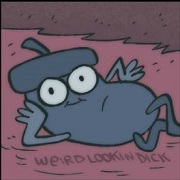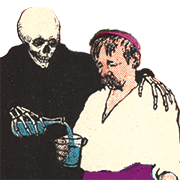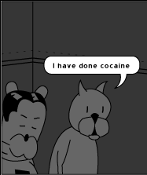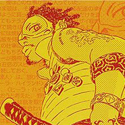|
PeterWeller posted:Howard embraces white supremacy there, but he doesn't do so entirely uncritically. He implicitly rejects the notion of cultural superiority with the "Aryan barbarian" line and explicitly rejects technology's role: "whether he be clad in wolf-hide and horned helmet, or boots and doublet—whether he bear in his hand battle-ax or rapier." All that's left to explain European superiority is the ruthless application violence, being "the supreme fighting man." Ghost Leviathan posted:Well, that figures. Almost gotta keep in mind there's more than one way to be racist. Actually that does dovetail with a lot of white supremacist and fascist ideology that goes on about decadence and degeneracy more than savagery.
|
|
|
|

|
| # ? Apr 29, 2024 05:20 |
|
PantsBandit posted:Anyone played Aeon's End? My friends and I are playing and trying to determine if there is any upper limit to how many cards the nemesis can have in play.
|
|
|
|
Warthur posted:In the Conan stories the Picts if anything are even more Native American-coded than the Cimmerians, despite the name "Pict" - again probably playing on the aforementioned crank theories about Also makes sense considering Lovecraft identified as upper-class despite pretty much dying of poverty, given he'd grown up in a once-wealthy family. (dude needed universal healthcare for both physical and mental reasons) While iirc Howard killed himself the day after his mother, who he'd lived with all his life, died. There's a lot to unpack here.
|
|
|
|
<mod edited, contained personal info>
Somebody fucked around with this message at 21:21 on May 20, 2021 |
|
|
|
Ghost Leviathan posted:Howard killed himself the day after his mother, who he'd lived with all his life, died. There's a lot to unpack here. There's even a weird tragic romance movie about it: https://www.imdb.com/title/tt0118163/ (The romance is between Howard and Novalyne Price, a local school teacher, not Howard and his mother, but also kinda between Howard and his mother.)
|
|
|
|
Ghost Leviathan posted:Also makes sense considering Lovecraft identified as upper-class despite pretty much dying of poverty, given he'd grown up in a once-wealthy family. (dude needed universal healthcare for both physical and mental reasons) While iirc Howard killed himself the day after his mother, who he'd lived with all his life, died. There's a lot to unpack here. Both died pretty young, I imagine both would have grown more as people had they lived longer, particularly because of WW2
|
|
|
|
Ghost Leviathan posted:Also makes sense considering Lovecraft identified as upper-class despite pretty much dying of poverty, given he'd grown up in a once-wealthy family. (dude needed universal healthcare for both physical and mental reasons) While iirc Howard killed himself the day after his mother, who he'd lived with all his life, died. There's a lot to unpack here. Yeah, Lovecraft was a big believer in a sort of natural aristocracy which was based on good breeding (so it has no connection to wealth) and his entire political philosophy was based around what he would think would allow people like him to scrape by idly doing art and poetry. There's a reason why At the Mountains of Madness has him sympathising (via his narratory proxy) with the Old Ones more than the Shoggoths.
|
|
|
|
That specific passage is why I consider AtMoM one of Lovecraft's better stories.  It's not intentional but it ends up indicting his protagonist. Although the all-time best is still Dream-Quest of Unknown Kadath, where it's revealed that the mechanism by which the protagonist has been seduced into the world of the weird, the thing that drives him to risk madness and death to obtain it, is simply nostalgia.
|
|
|
|
Oh yeah, I love that bit. "What did they do that we would not have done in their place? They may have been space aliens, but they were imperial slavers just like us!"
|
|
|
|
Tuxedo Catfish posted:That specific passage is why I consider AtMoM one of Lovecraft's better stories.
|
|
|
|
Anyone have strong feelings about large roll tables and how they should be designed? I'm trying to finish a "one roll" table for generating a god and then make another to create a cult that worships them. I like the flavor that tables with really specific results can give, but I thought something with more generalized categories as results would allow for a longer shelf-life and more variety from similar results. But as I'm getting closer to finishing the first table, the results kind of feel really generic in a way that's kind of deflating and still tough to create specific details out of. For example, my first test roll resulted in a god that exists as or has domain over "musical instrument(s) or record player(s)" and wants to "create a new form of life" through a doctrine of "individual freedom or libertarianism." I... don't really know what to do with that. I mean, if I worked at it, I could come up with something, but for someone looking to a table to generate a deity for them, that still leaves a lot of work for them to do. The second result was a god of/in "apocryphal scroll(s)" that wants to "make a replacement for itself" through a doctrine of "participation or democracy." The third was a god of/in "traders or shopkeeps" that wants "to release its followers souls or selves" through a doctrine of "hunger or gluttony." There's definitely something there to work with, but... should I give up on this more concept/category-driven attempt and go for super-specific, unique results? Or maybe just provide more example situations of how to develop these results into something specific and workable? Is there a clear distinction in audiences, where maybe more OSR-types like the really specific tables, and modern RPG fans like the broader categories that give them a bit more space for their own world-building? Or some received knowledge about which type of table gets more use? Here's a link to my (about 85% done) work-in-progress table if it helps.
|
|
|
|
JMBosch posted:Anyone have strong feelings about large roll tables and how they should be designed? I'm trying to finish a "one roll" table for generating a god and then make another to create a cult that worships them. I like the flavor that tables with really specific results can give, but I thought something with more generalized categories as results would allow for a longer shelf-life and more variety from similar results. But as I'm getting closer to finishing the first table, the results kind of feel really generic in a way that's kind of deflating and still tough to create specific details out of. I can't really speak to the whole new school versus old school thing, frankly idk how good your average "modern" player is at using tables in an oracular fashion. What I CAN tell you that's immediately obvious is that your structure - this set of "roll exactly this set of dice and then interpret that one roll and no more" - is handicapping you. You're having trouble filling the tables, which tells me you're stuck for ideas to fill the structure you came up with first, and it also makes your language unclear. (Am I rolling for the deity's form? Or is that what it has a domain over?) I'd break it out - just have separate tables, and you can roll on any or all of these until your deity makes sense. It's okay to have alternative ideas (ie: you can roll on any one of these three tables for its domain), and often I find having discrete rolls actually helps me get an idea of what the tables are helping me create, as it's kind of a multiple passes to get the idea across and play with it in my head. If it's separate rolls, it's also much easier to reroll results that don't make sense, which is an important part of any oracular table IMO.
|
|
|
|
I never read Howard's earlier stories, I pretty much started and finished with Conan - I tried one or two others but didn't get into them - so I wasn't really aware of how his racism was expressed in his fiction prior to 1932, when his first Conan story "The Phoenix on the Sword" was published. I feel confident in saying that by the time he wrote his final stories in ~1935-6, he had evolved at least a bit. Who knows if he'd have changed his views more. I think the proper take-away though isn't "boy were these guys racist" but more "these racist ideas about civilization and humanity were prominent and widely popular." There's hardly any Western fantasy or SF from that era that doesn't have some amount of racist tropes built in. It's kind of cool to see how far we've come in 100 years, although we still have a long ways to go.
|
|
|
|
Leperflesh posted:I think the proper take-away though isn't "boy were these guys racist" but more "these racist ideas about civilization and humanity were prominent and widely popular." There's hardly any Western fantasy or SF from that era that doesn't have some amount of racist tropes built in. It's kind of cool to see how far we've come in 100 years, although we still have a long ways to go. I...am going to push back against this. Historically we have unambiguous evidence that Howard & Lovecraft's contemporaries thought they were exceptionally racist (from published reviews). We have evidence that their friends mocked them for it (from letters). Probably the most valuable thing about understanding their biographies is to understand that the views embedded in their fiction were neither ambient nor common. They were not passively transmitting the spirit of the times in general to the page, they had elaborate, deliberate theories of race that made them rather unpopular and that they wove into their stories. They were products of their time, but Langston Hughes was a product of that exact same time. So was Lewis Allan, Robert Musil, John Steinbeck, CLR James, Agatha Christie, and so on. I would not say any of these writers were remotely similar to Howard or Lovecraft on race issues. There are lessons to be drawn about the racism of the era. Probably the biggest thing is that though Howard and Lovecraft were racist to an extent outstanding for the era, the way that fit in socially was quite a lot different. They were definitely seen as weird and off-putting, but a lot of people tolerated or dismissed this flaw in a way that you don't really expect people to do today. A lot of people were very racist at the time, just not usually as elaborately or strongly as Howard and Lovecraft. And for what it's worth, I've never heard any accusations that they took part in a lynching or other direct act of racial violence. They neither represented a mainstream view nor did their extremism extend to action. If you're taking a scholarly view of nerd culture this is worth thinking about. Howard and Lovecraft did not find mainstream success in their lifetime, but they've had profound influence on later works, sometimes to pretty awful effect. This is something that TTRPGs continue to have to navigate given the massive legacy that in particular Conan has on the hobby. And I say this as somebody that likes Conan: it's important to be a careful and attentive reader to even the pulpiest fiction.
|
|
|
|
Tulip posted:I...am going to push back against this. Historically we have unambiguous evidence that Howard & Lovecraft's contemporaries thought they were exceptionally racist (from published reviews). We have evidence that their friends mocked them for it (from letters). Probably the most valuable thing about understanding their biographies is to understand that the views embedded in their fiction were neither ambient nor common. They were not passively transmitting the spirit of the times in general to the page, they had elaborate, deliberate theories of race that made them rather unpopular and that they wove into their stories. Not at all denying this is the case, but do you have any sources or links for this? It would be interesting to see what their issues and takeaways were, and the weird "still racist, but against blatant racism" of the pre-Civil Rights movement.
|
|
|
|
An interesting article that highlights that yeah, Howard was racist as hell, even for his own time.
|
|
|
|
Yeah Lovecraft was a racist prick but adding "for the time" is whitewashing "of the time" with such intensity that I'm beginning to suspect it's deliberate. He has repugnant ideas and beliefs, but they were entirely loving consistent with an era that deliberately infected black men with syphilis "for science," posed for photos in front of the bodies of lynching victims, and committed a race massacre in Tulsa. I might be hypersensitive to it, but I take issue with the idea that weird nerds writing stories nobody read were the era's aberrant high-scorers of racism. You have to step over the other racists' burning, shooting, beating and lynching of people to get there - and that seems gross. The violence didn't happen in a vaccum. Conditions were such that the violence would happen and be acceptable because prevailing attitudes were acceptable. Racists committed atrocities and got away with them because they weren't viewed as atrocities. I feel like with Lovecraft and Howard, we have unfiltered access to their attitudes (and the attitudes of the time) because they didn't leave family or estate to clean up after them. Consider that they lived in a world where it was completely acceptable to write inconceivably racist ideas in a letter. I'd hold them up as exemplary racists of their time, and that the time was worse than most people realize.
|
|
|
|
I don't generally put Lovecraft and Howard into the same bucket - we've been talking about them both but I did not say that Lovecraft was typical of his time. I also specifically said Fantasy/SF authors, not authors in general. That said, I clearly need to do more reading about this, because boy do I not want to seem to be defending racism in any way.
|
|
|
|
Yeah. Lovecraft might have had friends who thought he was too racist, but in 1921 when he published the first story in the Cthulhu mythos, the Tulsa Race Massacre happened. It does not excuse him. He could have and should have known better. He would have known and heard more modern ideas and philosophies of social justice - there were plenty even at the time. But I think it's also true to say that his more-enlightened friends and colleagues were the outliers, not him. Which, again, is not to excuse him, but to put him in context as a guy with some nasty ideas who lived in a nasty time.
|
|
|
|
American and British fantastical fiction in the 1920s and 30s had a habit of seeking settings and peoples that the contemporary culture viewed as lurid, exotic, and other, as this pinged the specific ingrained cultural fears of their audience. You could place those "savage people" on Mars, or in real Africa, or in an imagined bygone age, but they were still basically saying "fear the other races" regardless. I'm thinking of Burroughs, Kipling, Meritt, EE Doc Smith, and I kind of run out of authors at that point, because I'm probably not as well read from that era as I should be to be pontificating about it, but I'd be surprised to hear of a markedly non-racist pulp fantasy author of the era.
|
|
|
|
I'm willing to cut Lovecraft and Howard both a little slack considering neither one was even remotely mentally well and their attitudes towards other races is very clearly a symptom of that, especially for Lovecraft
|
|
|
|
Leperflesh posted:American and British fantastical fiction in the 1920s and 30s had a habit of seeking settings and peoples that the contemporary culture viewed as lurid, exotic, and other, as this pinged the specific ingrained cultural fears of their audience. You could place those "savage people" on Mars, or in real Africa, or in an imagined bygone age, but they were still basically saying "fear the other races" regardless. I'm thinking of Burroughs, Kipling, Meritt, EE Doc Smith, and I kind of run out of authors at that point, because I'm probably not as well read from that era as I should be to be pontificating about it, but I'd be surprised to hear of a markedly non-racist pulp fantasy author of the era. You had Bulldog Drummond stories during that period where he wears blackface as a disguise but claims to be unable to imitate the "smell of a n-word", Howard and Lovecraft are only singled out because they were thr ones who kept popularity after a century.
|
|
|
|
Plutonis posted:You had Bulldog Drummond stories during that period where he wears blackface as a disguise but claims to be unable to imitate the "smell of a n-word", Howard and Lovecraft are only singled out because they were thr ones who kept popularity after a century. And Golden Age comic books, hoo boy.
|
|
|
|
Debating how problematic an author was 'for their time' is really just mental gymnastics to try and justify enjoying something they wrote even though you are fully aware they were a big drat racist. How much of a big drat racist compared to other big or not so big drat racists in the year 19XX they were is irrelevant and you don't gotta hand it to them, as they say. Like, I'm not gonna judge people for reading stuff written by problematic shitheads, we all do to some extent, knowingly or not, but please PLEASE don't try to make yourself feel better by pretending they were just one year out of a grand epiphany or their mental illness somehow explains or justifies their blatant racism. That's gross.
|
|
|
|
I think it's more an exercise that people engage to avoid confronting how bad things actually were in America "for the time." Nazi Germany based how it codified racism into law on America's lead, for example. We had a eugenics movement. I mean poo poo, look at Lovecraft's contemporaries; They were so aghast at his racism that they remained lifelong friends and maintained their correspondence. This idea might be more clearly expressed (and less apparently excusing) as "America was Lovecraft levels of racist back then."
|
|
|
|
Yeah I'm inclined to accepting all of the above honestly. I have always enjoyed Conan stories since I was first exposed to them as a young teenager, and I know that means I can't evaluate Howard in a totally unbiased way; but I've also been acutely aware of my bias since I was a young adult, and as an older adult I've tried to re-read them and understand them as both a fan of their literary merits but also as crystalized evidence of Howard's specific racist beliefs, and how the stories reflect the expectations and biases of his audience, his contemporaries and peers (and especially his favorite pen-pal), and of the society he lived in in general. 17 of his 21 Conan stories were published in Weird Tales, the same publication that ran most of his earlier fantasy stories (Solomon Kane, Bran Mak Morn, etc.). The remainder of his stories that were published during his lifetime ran in other pulps like Marvel Tales, Fight Stories, Action Stories, Sport Story Magazine, or were published standalone on the same rack as those pulps. These pulp magazines were sold more or less exclusively to white, lower and middle class teenage boys and young men. That context matters, because his livelihood depended on editorial decisions made by those publishers, both for good and for ill. The racism expressed in his earlier stories was not only accepted, it was reinforced and encouraged, explicitly or implicitly by those editorial decisions. And those decisions were driven in turn by the tastes of the customers buying pulp magazines, a small part of a much larger system of self-reinforcing feedback loops of culturally ingrained racism. Which is of course not an excuse. I have no intention and hope I have never come off as excusing Howard or anyone else. He was an individual human being and I try to keep that in mind. I think most people's views change over time (sometimes for the better, sometimes for the worse, usually a mix of both), and can even seem different from one conversation to the next. I've seen things in his writing that made me pause and wonder what he was thinking at the time he wrote it, made me wonder if he'd softened his viewpoint, or if this was just a meaningless deviation from an unwavering baseline of racist conviction. I think that's the only fair way to approach an author: you can read what they had to say, at various times, and consider each bit separately as well as the whole together, and maybe draw some broad conclusions like "boy this guy was definitely a racist" but it's best to not just treat the generalization as a replacement for the specific and detailed beliefs he held and expressed at various times. If you care to go into them, of course. So that's where I'm coming from. I think it's a reasonable perspective to take on both the long-past authors whose influence looms over the history of RPGs, and on contemporary RPG and fantasy/SF authors and publishers. Nuance doesn't automatically mean making excuses, but it can rhetorically come off as such if we begin with "this person's views are/were unacceptable" because it can seem like the whole conversation is an attempt to back off from that line.
|
|
|
|
moths posted:This idea might be more clearly expressed (and less apparently excusing) as "America was Lovecraft levels of racist back then." Why is Lovecraft the author who gets to be the voice of his generation? Why him over Langston Hughes or John Steinbeck or Agatha Christie or Zora Neale Hurston, who were all more popular at the time? To my knowledge Lovecraft & Howard did not personally participate in any of the quite frequent terrorism of their age. But they did have exceptionally elaborate and strongly-held views. To use a contemporary analogy, America has a lot of very racist mass shootings during my lifetime. I would hope that future generations would not look at us and say that "reddit user SuperSlurLord was the average American" and justify it because he didn't personally burn down a synagogue.
|
|
|
|
Reddit user SuperSlurLord probably is the average American. That doesn't carry any of the moral exoneration you seem to be associating with it. The phrase "product of their time" isn't absolution of the individual, it's an indictment of their era.
|
|
|
|
moths posted:The phrase "product of their time" isn't absolution of the individual, it's an indictment of their era. THANK YOU. This is a much more succinct way of saying what I was trying to say.
|
|
|
|
There's no such thing as an "average american" and there's no single person who can represent an entire generation or even just a generation of authors. Without accurate unbiased polling we can't even know what the typical range of opinions were on any one subject. "Racism" is far too broad and complex of a phenomenon to completely understand even if we had detailed accurate unbiased polling. All that said: I'm quite convinced that era is worthy of indictment nevertheless, based on what I know of history and the cultural touchstones I'm aware of from the times. We can broadly indict that era without excluding the fact that there were exemplary and laudable people fighting hard against racism, sometimes with some success, at the same time.
|
|
|
|
Maybe a useful exercise would be to recommend authors who similar to Howard and Lovecraft but are less racist or are even minorities themselves?
|
|
|
|
Fantasy/SF authors of the same era? Or, just generally? If the latter, I bet we can come up with some. Of the former... that's a challenge.
|
|
|
|
whydirt posted:Maybe a useful exercise would be to recommend authors who similar to Howard and Lovecraft but are less racist or are even minorities themselves? C. L. Moore is honestly still kinda racist but she's far more ambivalent about indigenous cultures than Howard or Lovecraft, and is an interesting point of reference as one of the few women Weird Fiction writers of the era.
|
|
|
|
It looks like she, especially in collaboration with her husband, was quite prolific. Would you recommend anything in particular?
|
|
|
|
Fittingly for the forum, Paizo published collections of the Jirel stories and the Northwest Smith stories — fantasy and planetary romance respectively. Only physical editions, unfortunately. Gutenberg also has a couple of the Northwest stories: https://www.gutenberg.org/ebooks/author/33397 Ah, and Shambleau is here: http://baencd.freedoors.org/Books/The%20World%20Turned%20Upside%20Down/0743498747__21.htm Plays into some bad stereotypes about women, but I think worth reading for the prose.
|
|
|
|
TY I will check them out!
|
|
|
|
Shambleau is one of my all-time favorites. Like, yeah, it's about a predatory succubus and ultimately concludes that the protagonist was an idiot for feeling sorry for her and wrong to save her from a lynch mob but it's not terribly hard to read that conclusion as the characters justifying themselves rather than an objective truth.
|
|
|
|
Tuxedo Catfish posted:Shambleau is one of my all-time favorites. Like, yeah, it's about a predatory succubus and ultimately concludes that the protagonist was an idiot for feeling sorry for her and wrong to save her from a lynch mob but it's not terribly hard to read that conclusion as the characters justifying themselves rather than an objective truth. True. And it’s superb writing, particularly for a first story.
|
|
|
|
Leperflesh posted:Fantasy/SF authors of the same era? Or, just generally? If the latter, I bet we can come up with some. Of the former... that's a challenge. A good example of the latter is Charles R. Saunders. Also, the Griots: A Sword and Soul Anthology.
|
|
|
|

|
| # ? Apr 29, 2024 05:20 |
|
I mean if we're just going to list fantasy authors of ANY time (and who didn't inspire a bunch of RPGs and board games) who aren't problematic that's a really long list: Marlon James, Ursula K. Le Guin, Terry Pratchett, etc, but that's kinda way off topic for this thread.
|
|
|






























